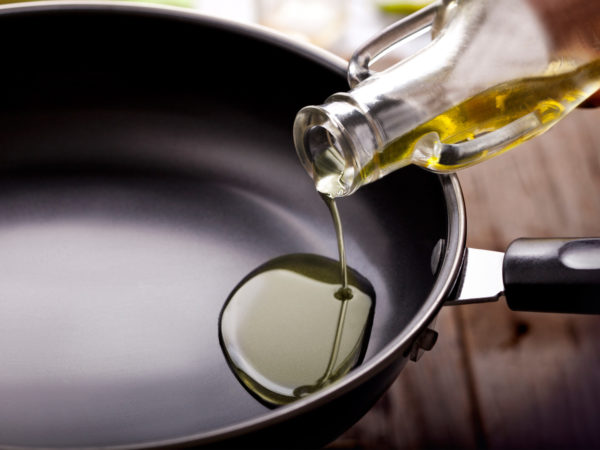Is Algae Oil Healthy?
I recently ate at a restaurant that served French fries made in algae oil because it is healthier than vegetable oil. What are your thoughts on this and do you recommend cooking with algae oil?
Andrew Weil, M.D. | December 23, 2016

Algae oil may not sound very appetizing, but in fact, it is a healthy oil with an excellent fatty acid profile. It has more monounsaturated fat than olive oil (13 grams per tablespoon compared to 9.9 grams for olive oil) and contains only four percent saturated fat compared to olive (14 percent), canola (seven percent) and coconut oil (87 percent). Algae oil is high in DHA (docosahexaenoic acid), one of the two omega-3 fatty acids we need for long-term physical and mental health. Studies have shown that supplementation with DHA from algae oil can lower triglycerides and boost both HDL (“good”) cholesterol and LDL (“bad”) cholesterol levels in people without heart disease. While higher LDL isn’t desirable, the researchers noted that the data indicated an increase in the size of LDL particles. Small and dense LDL particles predict a higher risk of heart disease while larger ones may be protective.
I’ve been using algae oil at home for sautéing when I don’t want the flavor of olive oil. It has a higher smoke point (the temperature at which oil starts to burn and fats oxidize quickly), 485 degrees Fahrenheit, compared to 440 degrees for peanut oil, 400 for canola oil, 390 for grapeseed oil, 375 for olive oil, and 320 for corn oil. This makes it more suitable for high-temperature cooking such as stir-frying and searing. (However, I urge you generally not to fry food, and to learn to cook at lower temperatures to avoid the health risks of oxidized fats.)
Marine algae are the original source of algae oil, but they’re then farm-raised and grown in sterile fermenters where they feed on plant sugars. After a few days of this, the algae are expeller pressed to release their oil. If you’ve eaten French fries cooked in algae oil, you know that the taste is not fishy at all – it is as neutral as canola oil or vegetable oils. Unlike fish oil, algae oil is an acceptable vegetarian source of DHA. Algae oil should not be confused with blue-green algae supplements, which I do not recommend.
While algae oil for home and restaurant cooking is new, a number of foods have been fortified with it for some time. In 2001 the FDA approved adding DHA and another fatty acid, arachidonic acid (AA), from algal and fungal sources, to infant formulas. Formulas with these supplements have been sold in Europe and Asia for years. Other familiar foods fortified with algae oil include cheese, soymilk, fruit juices, sauces and tortillas.
Andrew Weil, M.D.
Source:
Adam M. Bernstein et al, “A Meta-Analysis Shows That Docosahexaenoic Acid from Algal Oil Reduces Serum Triglycerides and Increases HDL-Cholesterol and LDL-Cholesterol in Persons without Coronary Heart Disease.” The Journal of Nutrition, January 1, 2012, doi: 10.3945/jn.111.148973














